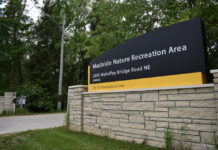by Gigi Wood
IOWA CITY – Taxicab price gouging and safety concerns could soon be a thing of the past.
New taxi rules in Iowa City are aimed at protecting customers and making business more fair for cab companies. At its July 12 work session, the Iowa City City Council discussed changes to taxicab regulations. The changes could end up as amendments to the city’s taxicab ordinance as soon as the council’s next formal meeting, Aug. 17.
“We directed staff to start putting together some regulations in the form of an ordinance to regulate it,” said Councilor Mike Wright.
City rules
The ordinance is expected to require meters in cabs, 24-hour dispatching stations for companies, elimination of special event rates, driver badge changes and increased inspection fees. The changes would affect Iowa City’s 18 cab companies, including the 86 vehicles and 300 drivers registered with the city clerk’s office as of July 7.
Comparatively, Des Moines and Cedar Rapids each have four companies — Des Moines with 227 drivers and Cedar Rapids with 180.
There are eight other urban areas in Iowa with taxi codes: Cedar Falls, Cedar Rapids, Council Bluffs, Davenport, Des Moines, Dubuque, Sioux City and Waterloo. West Des Moines and Ames do not have taxi codes. All but Cedar Falls requires meters in cabs. Each city has some type of driver requirements, whether it involves needing references or a police review. Many cities require posted rates and activity logs.
Taxicab changes are important to Mr. Wright, whose main mode of transportation is bicycling; so he often takes cabs to meetings and other events.
“I use these things more often than the other councilors,” he said. “There’re huge differences (between companies) and some companies I just don’t call.”
Requiring meters is a top concern.
“I think it’s appalling we don’t have meters in our taxis, in all of them. Quite honestly, I don’t think anyone ever thought much about it,” he said. “Apparently several years ago it was discussed at council, and they thought it would be the wrong thing to do at that time.”
Another concern is requiring a 24-hour dispatch station for companies, so drivers are not dispatching while driving.
“That’s just scary,” he said. “They’re not paying the least amount of time to their driving.”
The taxicab changes are reasonable and should not be difficult to enforce, he said.
“I think they’re all fairly legitimate businesses. I think it’s just a matter of getting some basic regulation into place,” Mr. Wright said. “Asking for dispatch and meters and posted rates is not radical, and actually we’re pretty much behind the other cities in the state that have cabs.”
The changes came about after the city began hearing numerous complaints from residents and visitors about price gouging.
“No one is more frustrated, more concerned about complaints of over pricing than the industry owners themselves. It puts them in a negative light; they realize that,” said Marian Karr, Iowa City’s city clerk, at the council’s July 12 meeting. “Our goal is not to make things more difficult but to get the legitimate companies who are providing a legitimate service to our community the ability to provide a good quality product.”
Cab company reaction
Iowa City’s larger, more-established cab companies have expressed support for the city’s proposed changes.
“After they last updated the ordinance, they made it far easier for cab companies to start up, which is fine,” said Roger Bradley, manager of Yellow Cab of Iowa City. “Competition is great. It’s actually done a good job of keeping lifted prices down, but what is happening is they’ve made it too easy to become a cab company. A lot of cab companies start up not because they want to be in the cab business, they want to earn a quick buck.”
Yellow Cab receives many complaints about some of those smaller companies, he said.
“We’ve had a number of complaints over the last two years that a lot of these companies get certain people in their cabs and some of these have meters and don’t use them or don’t have any meters,” he said. “And they’ll get people in their cab and take them some place and just over charge them.”
Mr. Wright and Mr. Bradley have both mentioned receiving complaints from visitors staying at the Coralville Marriott taking cabs to downtown Iowa City.
“It’s been a very common practice on weekends when there have been visitors in town,” Mr. Bradley said. “There’ve been times when we take people from downtown to the Marriott in Coralville and we’ll say ‘here’s the price, it’s $11’ and they’ll ask why they were overcharged the night before when they went downtown. Because it was the same number of people and they were charged $40.”
Mr. Bradley said those complaints were not generated from Yellow Cabs, but his drivers can’t give customers much of a solution for the problem.
“We welcome a lot of these (city) changes,” he said. “We feel it hurts our industry, it hurts our tourism industry in Iowa City to be overcharging visitors and even our residents.”
Requiring meters in cabs will be a step in the right direction, he said.
“We think meters alone will be a big help, if companies actually turn them on,” he said. “And that’s when enforcement comes in. If there are some consequences, maybe that will start to choke the problem away.”
Color schemes
At least two cab companies said there is one requirement overlooked in the changes. Both Mr. Bradley and Mark Paterno, owner of Marco’s Taxicab Co., would like the former color scheme requirement return to the city code. Four Iowa towns require color schemes on cabs, which make cabs more identifiable.
“Before they amended the ordinance last time, cab companies in Iowa City used to have to have a common color scheme,” Mr. Bradley said. “It helps consumer identify what cab they’re in. All of our cabs are bright yellow, it’s hard to miss. Even if you don’t read ‘Yellow Cab’ on the side of the door, you know you’re in a Yellow Cab.”
In a letter to the city, Mr. Paterno stated:
“We would like to see the color scheme reinstated. It is our position that there is no reason why a fleet of cars within the same company should not be the same. It is also our position that another company shouldn’t be allowed to replicate our (yellow with green checkers) cars via this ‘loophole.’”
Inspection fees
The city plans to raise inspection fees from $17.95 to $25 and decal fees from $49.81 to $60. Mr. Bradley, at least, said he was willing to pay the increase.
“No business wants to have a cost added to them, but it’s important to have inspected vehicles on the road, and certainly that’s going to cost the city and we realize it doesn’t come for free,” he said. “We don’t have a problem with that; it’s not going to affect how many cabs we put on the street. The city’s got to recoup its loss. The fees are a necessary evil.”
Special events rates
Mr. Bradley, however, does not agree with the city’s plan to eliminate special event rates. No other city in Iowa allows special event rates for cabs.
“The special event rates were basically created for one giant reason, that’s the (University of Iowa) home football game,” he said. “No other town in the state has a special event rate. But no other town in Iowa is quite like Iowa City. They don’t have a Big Ten university, they don’t have Kinnick Stadium and they don’t have these great big home football games.”
During home games, the company charges $4 per person instead of a rate per mile because expenses increase, he said.
“We burn a lot more fuel waiting in traffic, and with the demand that we have, we have all of our vehicles out there all day long,” he said. “So we have double the amount of dispatchers on duty those Saturdays. And we also have mechanics on duty, because if a car breaks and it’s an easy fix that will take two hours, at least we can get the car back on the street.”
Even if the city eliminates the special event rates, Mr. Bradley said he will be happy to see some changes made to the local industry.
“It’s a situation where we’re beyond the point of self-governance on this one because some companies we feel are on the up-and-up, they’re trying to run professional organizations and some are out there to make a quick buck,” he said. “And if they can get away with cheating someone they don’t care because maybe next year they won’t be doing this.” CBJ




